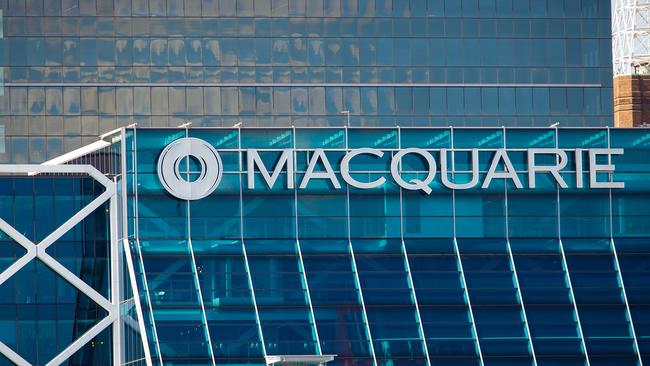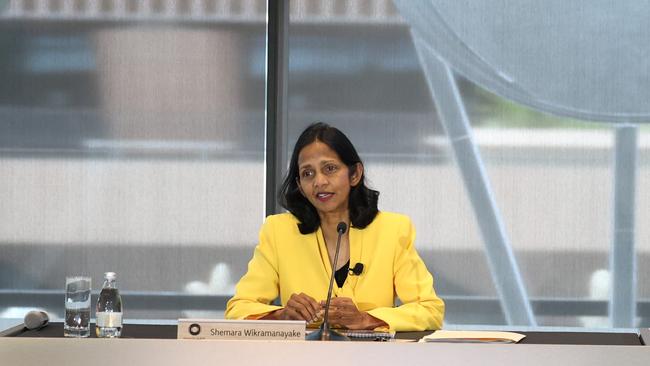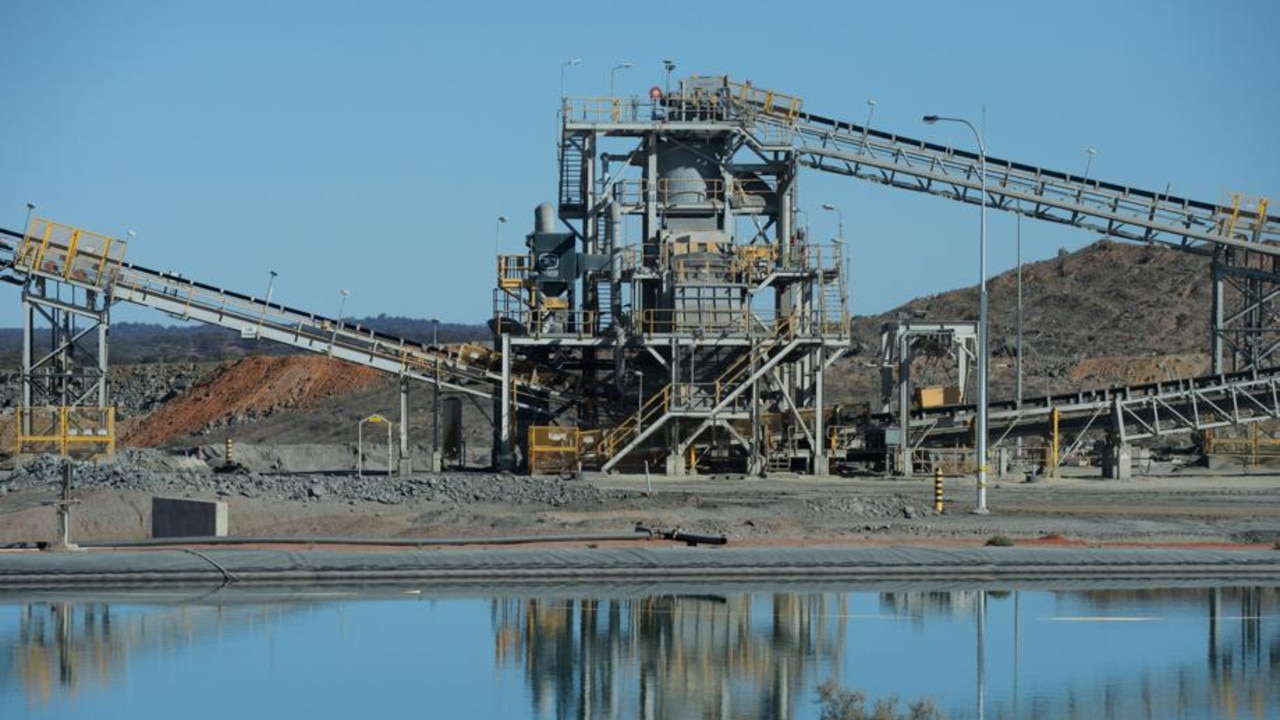Macquarie becomes first Australian bank to exit Net Zero Banking Alliance
Macquarie is the first major Australian lender to withdraw from the Net Zero Banking Alliance, while larger rival CBA will reassess its membership.

Business
Don't miss out on the headlines from Business. Followed categories will be added to My News.
Macquarie Group has withdrawn from the world’s largest climate banking alliance, making it the first major Australian financial institution to retreat since US President Donald Trump took office last month.
The ASX-listed financial services group quietly informed the market of its decision to leave the UN-backed Net Zero Banking Alliance (NZBA), following major US investment banks and lenders — including JPMorgan, Goldman Sachs, Citi, and Bank of America — in opting to implement its own transition strategy.
The Net Zero Banking Alliance is led by former Bank of England governor Mark Carney, who is bidding to succeed Justin Trudeau as Canada’s next Prime Minister and leader of the Liberal Party. The alliance, which includes Australia’s four largest banks and the Bank of Queensland as members, aims to cut net emissions to zero and limit the impact of climate change.
The decision marks a shift in the bank’s climate approach, with Macquarie saying it will now focus on “updating and delivering our plans and reporting in line with regulatory requirements”.

Macquarie joined the NZBA in 2021, alongside a wave of financial institutions pledging to align their lending and investment activities with net zero emissions by 2050.
“The NZBA helped develop global frameworks and assisted member banks as they established their initial decarbonisation plans. With those building blocks now in place, like many peers Macquarie will no longer be a member of NZBA, as we focus on updating and delivering our plans and reporting in line with regulatory requirements,” Macquarie said in a statement.
“We will provide a further update on our progress in our Annual Report in May 2025.”
Asked about Commonwealth Bank’s position on its NZBA membership, chief executive Matt Comyn told The Australia the lender would reassess its participation over coming months.
“We consider and revisit our settings regularly and will continue to do so,” he said.
“We are conscious of any changes in domestic government policy, specifically … to the extent that we would revisit anything associated with that (NZBA), we update our framework as part of our reporting suite in August, so that would be, specifically, the sort of time frame that we would be looking to consider or revisit any of our current commitments.”
Mr Comyn noted, however, there were “uniform, consistent commitments” in Australian politics around achieving net zero emissions by 2050.
“The long-term objectives I don’t think are under any sort of threat or challenge. Clearly in the near term of course we are conscious of … supporting our customers, the economy and conscious of any changes to federal policy we’ve had for some time.”
Macquarie has positioned itself as a major financier of the energy transition, investing in large-scale renewables, hydrogen, sustainable aviation fuel and carbon capture projects. It also provides advisory services for renewable energy transactions and capital solutions for carbon markets.
At the same time, Macquarie said it maintained an “orderly and just” energy transition was required continued engagement with high-emitting sectors.
“We also believe that the transition must be managed, orderly and just, which is why we have continued to support carbon intensive industries to reduce their emissions and continue to work with oil and gas companies, in recognition that much of the world will depend on carbon-intensive industries for a period as mitigation solutions are implemented,” it said.

Macquarie is the latest in a series of banks to step away from voluntary climate finance alliances. JPMorgan, Goldman, Morgan Stanley and Citi have all left the alliance in recent months, while global banks including HSBC, Barclays and Singapore’s DBS Bank remain members.
Kyle Robertson, senior banks analyst at the activist group Market Forces, criticised Macquarie’s decision, arguing that it reveals the bank’s true colours after years of branding itself as a “green” bank.
“It’s senseless that Macquarie has pulled out of the Net Zero Banking Alliance when the goals of the Paris Agreement are in jeopardy.”
“Macquarie’s betrayal of its net zero commitments are consistent with its recent decision to pour $65 million into the country’s biggest new gas development, the Beetaloo Basin. After years of touting itself as a green bank, Macquarie is showing its true colours following the big US banks into undermining global climate goals.”
The move by Macquarie comes after the Net Zero Asset Managers Initiative, including Macquarie Asset Management, IFM Investors, Magellan Financial, Maple-Brown Abbott and Metrics Credit Partners, suspended its activities in January due to the election of Trump and “different regulatory and client expectations”.
President Trump has been an opponent of emissions reduction initiatives and withdrew the US from the Paris climate agreement and enacted a range of measures to freeze green energy spending, including halting the disbursement of funds allocated through the Inflation Reduction Act.
Macquarie’s chief executive Shemara Wikramanayake was quizzed by analysts on Tuesday about how a second Trump presidency would play out for Macquarie’s green energy exposures in the US.
She said “the opportunity” in renewable energy had been pursued largely in Europe, followed by Asia, with the US accounting for about 10 per cent of Macquarie’s portfolio.
“To the extent we have (US) assets, we’ve had a look through them, some of them benefit from tax credits. That hasn’t been changed, so we’re still getting the tax credits on that,” Ms Wikramanayake said.
“Some of them benefit from disbursements and there’s a review of disbursements going on, but ours have all been committed and legally obligated to be made. And I think the ones being reviewed are the ones that have not reached that stage.”
Shares in Macquarie were up 1.1 per cent to $234.08 on Wednesday.
Separately, there have been questions about whether a trend by US-based companies to pullback from diversity, equity and inclusion policies will take hold in Australia.
Mr Comyn said while the bank had to be conscious of such changes in the operating environment and any local and international shifts in government policy, he favoured taking a longer-term approach over reacting to current events.
“It’s always important to try and look through the noise and remain focussed on the long term,” he added.
“We’ll continue to watch the context as it evolves closely and where necessary certainly consider any changes, but not react to the daily news flow.”
More Coverage
Originally published as Macquarie becomes first Australian bank to exit Net Zero Banking Alliance




